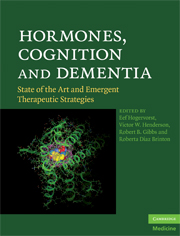Book contents
- Hormones, Cognition and Dementia
- Hormones, Cognition and Dementia
- Copyright page
- Contents
- Contributors
- Preface
- Section 1 Estrogens and cognition: perspectives and opportunities in the wake of the Women's Health Initiative Memory Study
- Section 2 Varieties of estrogenic therapy
- Section 3 Potential modulators and modifiers of estrogenic effects
- Section 4 Possible genetic factors related to hormone treatment effects
- Chapter 15 Possible genetic polymorphisms related to sex steroid metabolism and dementia in women
- Chapter 16 Genetics related to sex steroids: implications for Alzheimer's disease
- Chapter 17 Apolipoprotein E, hormone therapy, and neuroprotection
- Chapter 18 Testosterone, gonadotropins, and genetic polymorphisms in men with Alzheimer's disease
- Section 5 Testosterone, estradiol and men, and sex hormone binding globulin
- Section 6 Gonadotropin effects
- Index
- Plate Section
Chapter 16 - Genetics related to sex steroids: implications for Alzheimer's disease
from Section 4 - Possible genetic factors related to hormone treatment effects
Published online by Cambridge University Press: 06 July 2010
- Hormones, Cognition and Dementia
- Hormones, Cognition and Dementia
- Copyright page
- Contents
- Contributors
- Preface
- Section 1 Estrogens and cognition: perspectives and opportunities in the wake of the Women's Health Initiative Memory Study
- Section 2 Varieties of estrogenic therapy
- Section 3 Potential modulators and modifiers of estrogenic effects
- Section 4 Possible genetic factors related to hormone treatment effects
- Chapter 15 Possible genetic polymorphisms related to sex steroid metabolism and dementia in women
- Chapter 16 Genetics related to sex steroids: implications for Alzheimer's disease
- Chapter 17 Apolipoprotein E, hormone therapy, and neuroprotection
- Chapter 18 Testosterone, gonadotropins, and genetic polymorphisms in men with Alzheimer's disease
- Section 5 Testosterone, estradiol and men, and sex hormone binding globulin
- Section 6 Gonadotropin effects
- Index
- Plate Section
Summary
In this chapter, Chris Talbot discusses the evidence for involvement of genetic factors related to sex steroids in Alzheimer's disease (AD). He addresses the limitations of studies carried out including their small cohort sizes, a lack of stratification for sex, and a lack of consideration of other factors that might modify genetic risk such as age and prior hormone use. He concludes that currently the best evidence for genetic associations for AD with sex hormone genes are for the ERα and Aromatase genes in the estrogen metabolism pathway and DAPK1 for the estrogen responsive genes. However, given that genes in the sex hormone metabolism pathways operate in a coordinated fashion and that therefore epistatic interactions are likely, there is a need to analyze data on multiple SNPs in multiple genes simultaneously. Furthermore, since endogenous and exogenous hormones regulate the expression of the pathway genes, it may be crucial to measure circulating sex hormone metabolites and include these as co-factors in the analysis. Novel statistical techniques allowing higher order interactions used on combinations of large cohorts will hopefully render data that will allow future clinicians to take into account genetic profiles in deciding on an optimal hormone treatment plan.
- Type
- Chapter
- Information
- Hormones, Cognition and DementiaState of the Art and Emergent Therapeutic Strategies, pp. 153 - 161Publisher: Cambridge University PressPrint publication year: 2009



